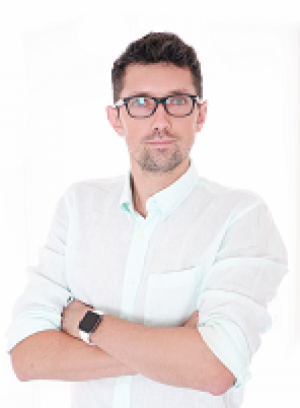Calls for Ukraine
Calls for Europe
Calls for USA

Alexander Stakhovsky has extensive experience of studying, internships and working abroad. He has practiced in Europe, Israel and Canada, specializing in transurethral, laparoscopic and endoscopic urogenital procedures.
He works in the Department of Laparoscopic, Endoscopic and Minimally Invasive Surgery at the National Cancer Institute. In an exclusive interview for MedTour, Alexander Stakhovsky spoke about current trends in oncourology, approaches to treatment in Europe and Ukraine, and the prospects for treatment at the 4th stage.
Please tell us about your work experience.
«After studying in Israel, Poland and Germany and internships in France, Poland and Canada, I have been working at the National Cancer Institute for the last 10 years. First of all, I deal with the treatment of kidney cancer, prostate cancer, testicular cancer and bladder cancer, less often — the treatment of cancer of other urological organs in men.»
What should a patient with prostate, kidney, or urinary tract cancer pay attention to when choosing a clinic?
«Exclusively for a specialist. All over the world, it has been proven that immediate results, such as survival, functional indicators of urine retention and preservation of potency, directly correlate with the success of a particular specialist. And the success of the work directly depends on the general work experience, the number of operations performed using this technology (laparoscopically, openly or with the help of a robot) and the number of operations per year.»
Can you give a comparative description of European clinics and treatment at the National Cancer Institute?
«Today it’s difficult to say that we are fundamentally different in terms of the quality of operations. Another important condition is also performed — at the moment, we are already offering our patients a comprehensive solution in the form of surgical treatment, chemotherapy and radiation therapy. Treatment is discussed and prescribed in a multidisciplinary manner, which is crucial for its effectiveness. I have to say that it is often difficult to get the necessary trimodal therapy even in the leading clinics of the world, since the specialists of each profile still work separately. We organized such treatment on the basis of one department, which we are very proud of.»
Patients with advanced stages are often treated. What can you recommend in this case?
«Of course, the treatment of patients in the late stages is a big problem. People tend to ignore the first symptoms and come to the doctor already with a common process. In such cases, more extensive and expensive treatment is necessary, in particular, at the expense of appropriate pharmacological medications. The good news today is that with the help of modern pharmacotherapy, in most cases, it is possible to achieve that patients live for many years.»
What are the unique treatments available at the National Cancer Institute?
«The uniqueness of the National Cancer Institute lies in the fact that most diseases are treated here laparoscopically. For oncological diseases, it is not so easy to provide the necessary amount of surgical intervention and safe margins within healthy tissues. We can do it here. Thus, patients are discharged faster and recover faster, and treatment is easier to tolerate.»
Patients often ask about treatment guarantees. What can you say about this?
«Unfortunately, the concept of „guarantees“ in medicine is impossible. Doctors can be very confident about something and give you a 90% chance, but they will never give you a 100% chance. We can say a little differently about guarantees. We never abandon our patients. We have checkpoints where we monitor the patient’s condition and determine the adjustment of the treatment plan. Checkpoints for patients who have overcome the disease and a plan of action in case the deterioration does occur. We don`t leave anyone alone with the problem.»
Is it possible to fully assess the situation and decide on a treatment plan before arriving at the clinic?
«Yes, absolutely. The main thing is that the patient undergoes all the necessary examinations at the place of residence: CT scan, biopsy, laboratory tests. Viewing images, examination results and remote consultation are not a technical or clinical problem. Thus, it is possible to tell the patient about the scope of treatment, prognosis and prospects even before his arrival at the medical institution.»
Note from the author.
The five-year survival rate for prostate cancer averages 98%. The ten-year survival rate is also 98%. This is a form of cancer for which cancer isn’t a death sentence for most patients. With timely treatment, minimally invasive operations and the preservation of sexual function in full are possible.
To make an appointment for a consultation, leave a request on the MedTour platform.
The statistics used in this article are available on the Canser-statistics website:
https://www.cancer.net/cancer-types/prostate-cancer/statistics
Please rate the work of MedTour
